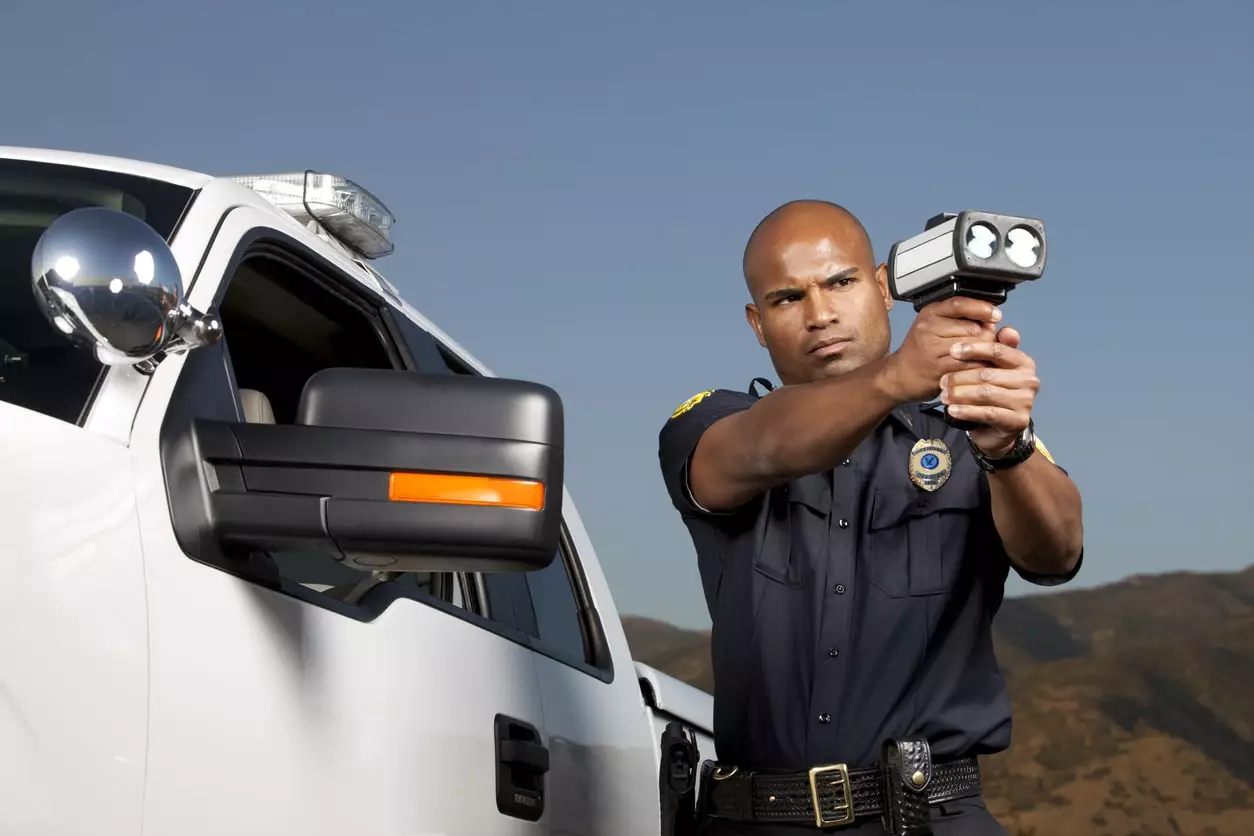 What Is a License Plate Reader and Can Police Track You Using It?
What Is a License Plate Reader and Can Police Track You Using It?
Table of Contents
- Washington License Plate
- Washington License Plate Design and Formats
- Washington Vanity License Plates
- Most Popular Washington Special Plate Numbers
- Washington License Plate Lookup
- What Do I Need to Get a License Plate in Washington?
- Differences Between a Passenger License Plate and Commercial License Plate in Washington
- How To Renew a License Plate in Washington
- How To Transfer a License Plate in Washington
- Washington License Plate Lookup Frequently Asked Questions (FAQ)
 Washington License Plate
Washington License Plate
A license plate, also known as a number plate or registration plate, is a plastic or metal plate attached to an automobile for official identification. Typically, it is a combination of alphanumeric characters allocated to vehicles by government agencies responsible for vehicle registration. The main purpose of a license plate is to provide vehicles with unique identities, making it easier for law enforcement agencies to monitor individuals and their vehicles.
Washington requires all vehicles in the state to have license plates. Both front and rear license plates are mandatory for most vehicles in the state. However, motorcycles, horseless carriages, and trailers are allowed to have only rear license plates. Washington standard license plates for vehicles have between one and seven alphanumeric characters, while those for small trailers and motorcycles have between one and six alphanumeric characters. Washington standard license plates for vehicles have three capitalized letters followed by four numbers. A Washington license plate must also display the state name on it. The Washington Department of Licensing (DOL) issues license plates to vehicles.
The following are the types of license plates in Washington:
- Standard license plates: The regular license plates issued to vehicles
- Special license plates: These are used to support and fund specific causes. They are also used to recognize specific professions or achievements
- Temporary License Plates: These are issued to Washington dealers or vehicles purchased from out-of-state dealers and are yet to complete their registration
- Personalized License Plate: Sometimes called custom or vanity license plate. There are two types of personalized license plates in Washington: personalized license plates that can be obtained for any registered automobile and personalized special license plates that can be issued to vehicles to promote special causes
Previously, the first three letters on a Washington license plate were county codes indicating the counties where the vehicles were registered. This practice was discontinued in 1981. Since1923, Washington license plates have been produced by inmates in Washington State correctional facilities.
 Washington License Plate Design and Formats
Washington License Plate Design and Formats
A Washington license plate is typically 12 inches by 6 inches (30 cm x 15 cm) in size for vehicles and trailers, while the dimensions for the plates issued to motorcycles and small trailers are 7 inches by 4 inches (17.8 cm x 10 cm). A standard license plate has a dark blue serial with a light blue Mount Rainier graphic on reflective white plates. "WASHINGTON" is written in red at the top left, and the Washington State slogan "EVERGREEN STATE" is written in red at the bottom center. Standard license plates have three alphabets followed by four numbers. The letters I, O, and Q are not used in the third alphabet position.
There are special license plates that display emblems or logos of their causes. The name of the cause often replaces the state slogan at the bottom. In addition, the alphabet portion of the serials is sometimes written vertically.
Standard license plates
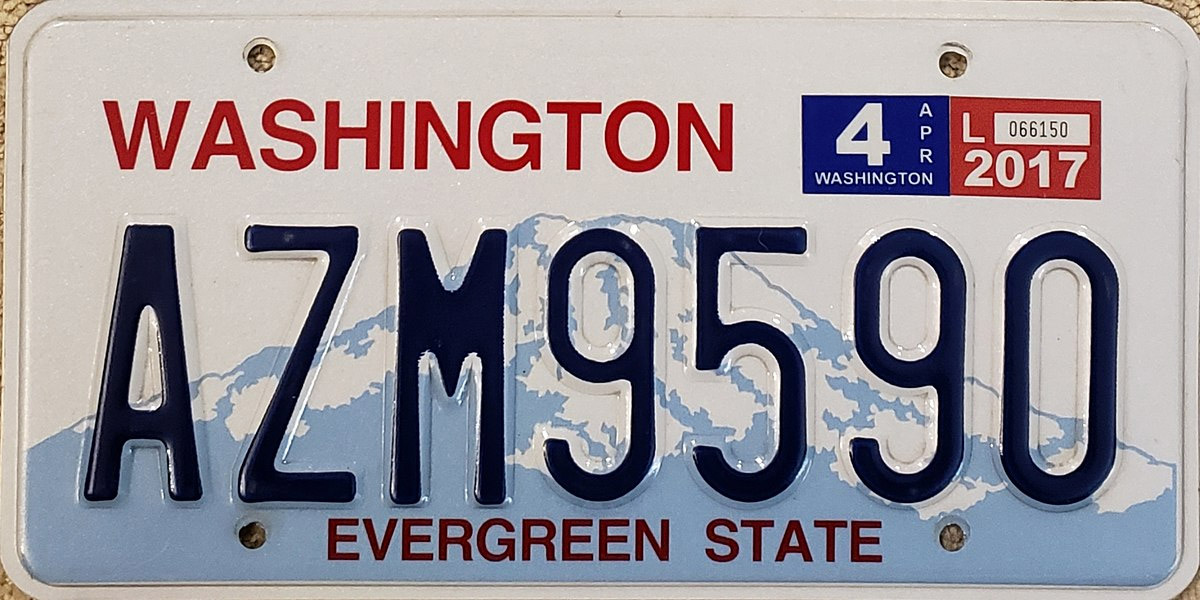
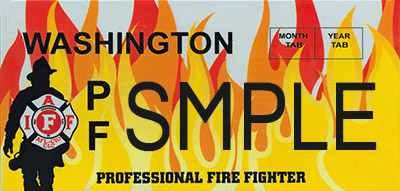
Special license plates
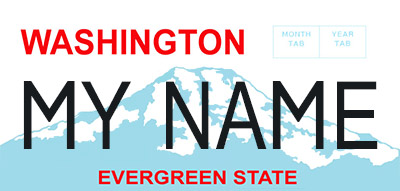
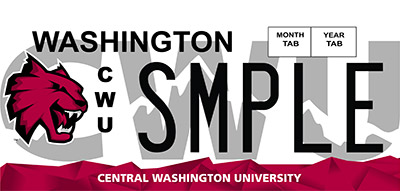
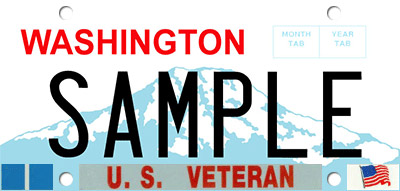
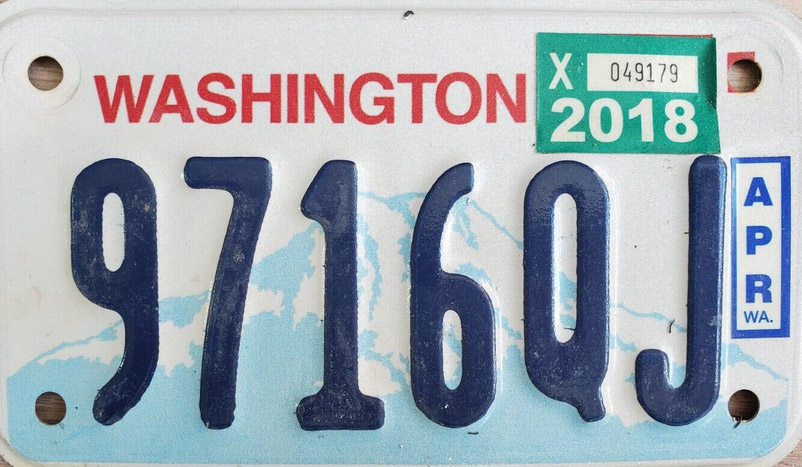
*Source: Washington Department of Licensing
 Washington Vanity License Plates
Washington Vanity License Plates
Vanity license plates, or personalized license plates, are special license plates displaying personalized messages chosen by vehicle owners which are different from the standard alphanumeric characters assigned by the government. Personalized license plates attract additional fees and might take longer to issue.
There are two types of personalized license plates in Washington: personalized license plates and personalized special license plates. Personalized license plates can be given to all types of automobiles and can only display the personal messages of the vehicle owners. On the other hand, a personalized special license plate displays a personal message on a special license plate designed for a specific cause. An applicant for a personalized special license plate must pay the fee for both personalized license plate and special license plate.
The following rules apply for personalized and personalized special license plates:
- Must have between one and seven characters for vehicles and between one and six characters for motorcycles and small trailers
- No special characters such as @, #, $, %, &, !, and +
- Vulgar, ethnic, racial, sexual, and indecent messages are prohibited
- Must not conflict with an existing license plate
An applicant for a personalized Washington license plate can use the state's Lookup personalized plates tool to confirm if their desired sequence is available. If available, they can visit a vehicle licensing office to submit the completed Specialty License Plate Application form and pay the appropriate fees. Alternatively, they can mail their application with the appropriate fees made payable to the Department of Licensing to:
Application and IssuanceDepartment of Licensing
P.O. Box 9909
Olympia, Washington 98507-8500
The costs for personalized license plates are:
- Passenger vehicle - $169.25
- Trailer - $117.25
- Truck - $168.50
- Motorcycle - $87.25
The costs for personalized special license plates are:
- Passenger vehicle - $209.25
- Trailer - $157.25
- Truck - $208.50
- Motorcycle - $127.25
Personalized and special license plates must be transferred to new vehicles within 30 days of the sale of the previous vehicles or they will be canceled and made available to other vehicle owners. Similarly, if a personalized license plate is not renewed within 45 days of expiration, it can be given to another vehicle owner. Getting a personalized license plate in Washington may take up to 3 months.
 Most Popular Washington Special Plate Numbers
Most Popular Washington Special Plate Numbers
The most common special license plates in Washington are:
- Colleges and Universities
- Army
- Veterans
- Professional Firefighter
- Breast Cancer
- Music Matters
- National Guard
- Navy
- Air Force
- Coast Guard
- Gold Star
- Collector vehicle
- Rideshare
- Purple Heart
- Foreign Organization
- Amateur Radio
 Washington License Plate Lookup
Washington License Plate Lookup
Using a vehicle's license plate number, one can find information about the vehicle such as its manufacturer and model, mileage, repair history, accident history, and history of repossession. The following are some common reasons to lookup Washington license plates:
- To find out about the car's accident history
- To look into a used vehicle's past before making a purchase
- For law enforcement purposes
Washington state does not allow individuals to conduct third-party license plate lookups that reveal details about vehicle owners. However, vehicle owners can apply to the Department of Licensing to look up information about their vehicles. They must provide their plate numbers and VINs to the vehicle licensing office for the search.
Alternatively, RecordsFinder and other third-party websites can be used to look up license plates.
Washington Reverse License Plate Number Search
In Washington, vehicle owners can use the RecordsFinder website to search for reverse license plate numbers. The results of such lookups are useful for gathering information about vehicles registered to the searched license plate numbers. However, the stated purposes of these searches must be in line with state and federal privacy regulations regarding reverse license plate lookups.
 What Do I Need to Get a License Plate in Washington?
What Do I Need to Get a License Plate in Washington?
The requirements to obtain a Washington license plate are:
- Completed Vehicle Title Application form (Form TD-420-001)
- Proof of ownership
- Proof of identity
- Completed Vehicle/Vessel Bill of Sale (Form TD-420-065)
- Out-of-state vehicle title, if applicable
- Proof of emissions inspection, if applicable
- Payment of required fees
An applicant can submit the required documents in person at any Washington vehicle licensing office or send it to them by mail. They can pick up their standard license plate the same day they submit all required documents or get it by mail within 3 weeks.
The fees for Washington vehicle license plates are as follows:
- Vehicle and trailer license plate - $50
- Motorcycle license plate - $20
- There are additional fees for special or personalized license plates
 Differences Between a Passenger License Plate and Commercial License Plate in Washington
Differences Between a Passenger License Plate and Commercial License Plate in Washington
The typical license plates given to vehicles for private usage are called passenger license plates. On the other hand, vehicles used for business, such as buses, taxis, and commercial trailers, are given commercial license plates. However, Washington issues commercial or passenger license plates based on gross weight. Automobiles with gross vehicle weights (GVW) greater than 26,000 pounds are classified as commercial vehicles and are given commercial license plates. Also, vehicles that transport hazardous materials are issued commercial license plates.
The table below shows the differences between passenger and commercial license plates in Washington:
| Features | Passenger License Plate | Commercial License Plate |
|---|---|---|
| Gross Vehicle Weight |
|
|
| Vehicle Use |
|
|
| Design and Color |
|
|
| Requirements to obtain a License plate |
|
|
 How To Renew a License Plate in Washington
How To Renew a License Plate in Washington
Washington vehicle owners must renew their vehicle registration and license plate tabs annually. The Washington Department of Licensing handles vehicle registration renewals and sends renewal notices to vehicle owners 3 weeks before the expiration of their vehicle registrations. Vehicle owners can renew their vehicle registration online, in person at vehicle licensing offices, or by mailing the documents to vehicle licensing offices. For online renewal, they must do the following:
- Visit the Washington vehicle registration renewal website
- Input the license plate number
- Input the last name or last four digits of the VIN
- Pay the required amount on the website with any convenient payment method
To renew in person, visit a vehicle licensing office with the following:
- Renewal notice or current registration
- Vehicle emission test completion result
- Copy of government-issued photo ID
- Proof of Washington residence
- Required fee
These must be mailed to a vehicle licensing office if the renewal will be done via mail. The Department of Licensing will mail the vehicle registration tabs typically within 10 business days but can be picked up the same day if done in person.
Washington vehicle registration renewal fees vary depending on the vehicle's worth, gross weight, county of registration, type of plate, and mode of renewal. Vehicle owners can get an estimated fee via the Department of Licensing's Vehicle Tab Estimator website.
 How To Transfer a License Plate in Washington
How To Transfer a License Plate in Washington
In Washington, a vehicle owner may only transfer a vehicle's license plate to a new one of similar use registered in their name. They can transfer the license plate by visiting a vehicle licensing office or mailing the required documents to a vehicle licensing office. The following must be submitted to effect the transfer:
- A copy of the registration of the new vehicle
- A letter stating the vehicle owner's desire to have the license plate transferred to the new vehicle. The letter must include:
- The license plate number
- Current Washington residence and mailing address
- Replacement fee
 Washington License Plate Lookup Frequently Asked Questions (FAQ)
Washington License Plate Lookup Frequently Asked Questions (FAQ)
Can I Get a Replacement for My Lost License Plate in Washington?
A vehicle owner in Washington can get replacement license plates by completing the Affidavit of Loss/Release of Interest form and submitting it to the nearest vehicle licensing office. They must pay the replacement fee of $13.75 for passenger vehicle/trailer and $13 for trucks. The replacement license plate is available for pick up by the next business day.
What Do Police See When They Run Your License Plates in Washington?
The following information may be obtained when a license plate is run by the police in Washington:
- Vehicle details, such as year, make, model, and color
- The vehicle's registration status
- Details of the vehicle's registered owner
- Outstanding warrants and criminal history
- Stolen vehicle alerts
What is the Penalty for Driving with An Expired License Plate in Washington?
Washington license plates are valid for a year and must be renewed annually. Washington typically does not give a grace period on vehicle plate renewal. However, if a license plate expires on a public holiday or weekend, the vehicle owner has until the end of the next business day to renew the vehicle registration.
The penalty for driving with an expired license plate tag depends on how long the plate has expired. There is a penalty of $145 for license plates that have expired for not more than 2 months and $237 for those that have expired for more than 2 months. The penalty for expired temporary license plates is the same as that for permanent license plates. Vehicle owners with personalized license plates may lose their personalized license plates after 45 days of default.
Do I Need to Return License Plates in Washington?
Vehicle owners in Washington do not have to return standard license plates. They can keep them as mementos or recycle them. They may also return them to their vehicle licensing offices for disposal. However, specialty and personalized license plates must be returned to the Washington State Department of Licensing.
Possible reasons for disposing or returning license plates in Washington include:
- Sale of the vehicle without transferring the license plate to another vehicle
- Moving out of Washington
- Damage to the license plate
Can I Keep my Washington License Plate if I Move to Another State?
Washington allows vehicle owners to keep their standard license plates. The Washington Department of Licensing cancels the vehicle registration once the car is registered in another state. However, personalized and specialty license plates must be returned to the vehicle licensing office that issued them. The specialty license plates can be returned in person or mailed to:
Department of Licensing1125 Washington Street SE
Olympia, WA 98504
Failure to return a deregistered personalized license plate in Washington state is a misdemeanor and attracts a penalty of up to 5 days imprisonment and a fine of up to $200.
What Size are License Plates in Washington?
The sizes of license plates in Washington are as follows:
- License plates for vehicles and large trailers are 12″ x 6″ (30 cm x 15 cm)
- License plates for motorcycles and small trailer are 7″ x 4″ (17.8 cm x 10 cm)
How Long Can You Drive with Temporary License Plates in Washington?
Temporary license plates are usually issued to vehicles that are yet to be fully registered in Washington. The types of temporary license plates in Washington are:
- Dealer temporary license plates: Registered car dealers in Washington are allowed to issue temporary license plates for vehicles sold pending when the permanent license plates will be issued. It is valid for 45 days
- Department temporary license plates: These plates can be obtained by vehicle owners whose applications for permanent license plates are pending. It typically applies to vehicles purchased from out-of-state dealers or directly from other individuals. The license plate is valid for 60 days
- Trip permit: A vehicle owner may obtain a trip permit to allow them to drive their vehicle on Washington public roads for 3 days. A maximum of three trip permits may be issued within 30 days
What Are the Steps to Renew License Plates in Washington?
The steps to renew Washington license plates in person or via mail are as follows:
- Visit a Washington vehicle licensing office with the following or send them via mail to the vehicle licensing office:
- Renewal notice
- Current registration or license plate number
- Copy of government-issued photo identification card
- Proof of Washington residence
- Appropriate fees (checks and money orders must be made payable to the Washington Department of Licensing)
The steps to renew a Washington license plate online are:
- Visit the Washington vehicle-renewal website
- Input license plate number and last four digits of VIN or last name
- Pay the required fees shown
What Do I Do if My License Plate Is Lost or Stolen in Washington?
If your Washington license plate is lost or stolen, you must do the following:
- Report the loss/theft to the local police department or county sheriff and obtain a police report
- Report the loss or theft to the Washington Department of Licensing by submitting the Affidavit of Loss/Release of Interest form. The form must be completed before a licensing agent at a vehicle licensing office or before a notary public
- Pay a replacement fee of $13.75 for a passenger vehicle/trailer or $13 for trucks
A replacement license plate will be ready the next business day after submitting the form and making the payment.
 Related Articles
Related Articles
The information on this website is taken from records made available by state and local law enforcement departments, courts, city and town halls, and other public and private sources. You may be shocked by the information found in your search reports. Please search responsibly.
Recordsfinder.com is not a “consumer reporting agency” and does not supply “consumer reports” as those terms are defined by the Fair Credit Reporting Act (FCRA). Pursuant to our Terms of Service and Privacy Policy, you acknowledge and agree not to use any information gathered through Recordsfinder.com for any purpose under the FCRA, including but not limited to evaluating eligibility for personal credit, insurance, employment, or tenancy.
Searches of license plate and VIN information are available only for purposes authorized by the Driver’s Privacy Protection Act of 1994 (DPPA).
By clicking “I Agree” you consent to our Terms of Service, agree not to use the information provided by Recordsfinder.com for any unlawful purposes, and you understand that we cannot confirm that information provided below is accurate or complete.
The search you are about to conduct on this website is a people search to find initial results of the search subject. You understand that any search reports offered from this website will only be generated with the purchase of the report or account registration.



